 This year we have experienced a number of real life events which if you saw them in a movie, would test the limits of your credulity. So perhaps appropriately, I have received a couple of questions about the representation of real life events in movies. Kathleen Drumm, Industry Director for the Toronto International Film Festival (TIFF) is running a session on 5th December entitled ‘Based on a True Story‘ and she emailed to ask about the current state of movies based on real life events.
This year we have experienced a number of real life events which if you saw them in a movie, would test the limits of your credulity. So perhaps appropriately, I have received a couple of questions about the representation of real life events in movies. Kathleen Drumm, Industry Director for the Toronto International Film Festival (TIFF) is running a session on 5th December entitled ‘Based on a True Story‘ and she emailed to ask about the current state of movies based on real life events.
I’m going to tackle this in two parts. Today, I am going to look at the number of movies made based on real life events and then next week we’ll look at the quality and success of such movies.
Real life is on the rise
Of the movies released in American cinemas during 1996, only 7.7% were based on real life events, compared with 27.2% twenty years later.
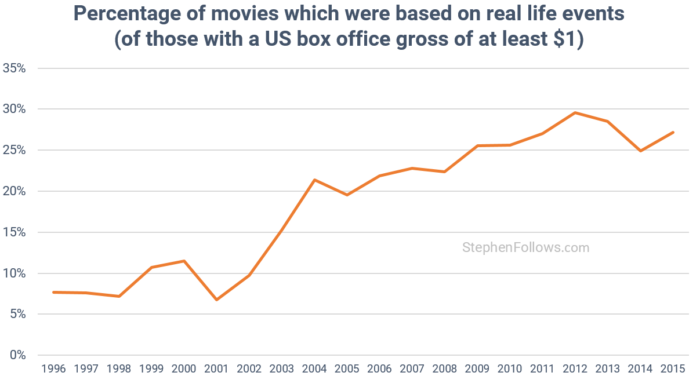
This raises the question; if movies based on real life events are taking an ever-bigger share of the output, what other script sources is it crowding out?
Movies based on original screenplays have held steady, at just over half of the movies released, meaning that it’s adaptions from other sources that have proportionally declined.
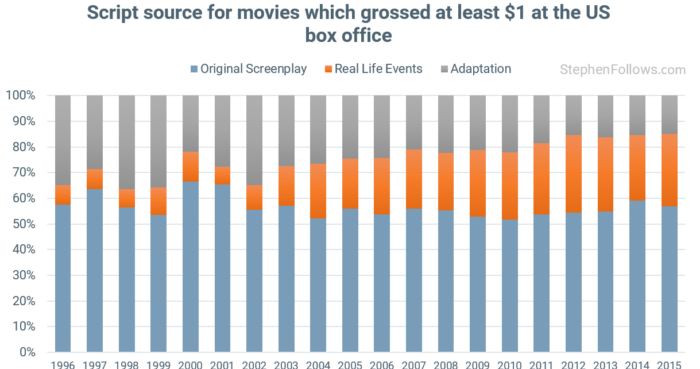
The term ‘original screenplay’ can be a misleading as it doesn’t relate to the creative originality of the concept, but rather the source of the script. For example, the following films all have ‘original screenplays’; Fast and Furious 7, Saw IV, Final Destination 5, A Good Day to Die Hard, The Expendables 3, Rio 2 and Evan Almighty. If you want to know more about this, check out my article from last year on how original Hollywood movies are as well as my studies of Hollywood remakes, reboots and sequels.
Where are all the movies based on real life events?
If the rapid rise of real life movies feels slightly at odds with your experiences at the cinema then it could be because not all movies are treated equally. And there’s no better illustration of this than by looking at how much money movies based on real life events have grossed.
Whilst the number of movies based on real life events has grown threefold in the past twenty years, the share of revenue they collect has grown at a slower rate. In the five years between 1996 and 2000 (inclusive), real life stories took an average of 5.5% of the US box office. In the five years between 2011 to 2015 (inclusive), it was 10.2%.
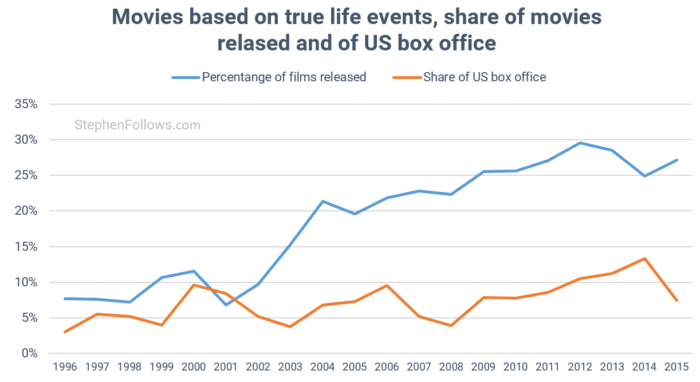
Hidden in plain sight
The large increase in real life movies has mostly been in lower-budget filmmaking, with only 2.9% of movies budgeted over $100m being based on actual events (including Deepwater Horizon, Alexander, Pearl Harbor, The Perfect Storm, The Aviator, Ali and American Gangster).
A bigger budget normally leads to a larger marketing spend, greater monopolisation of cinema screens and consequently bigger box office receipts. Therefore, a lot of the movies based on real life events will have passed most moviegoers by.
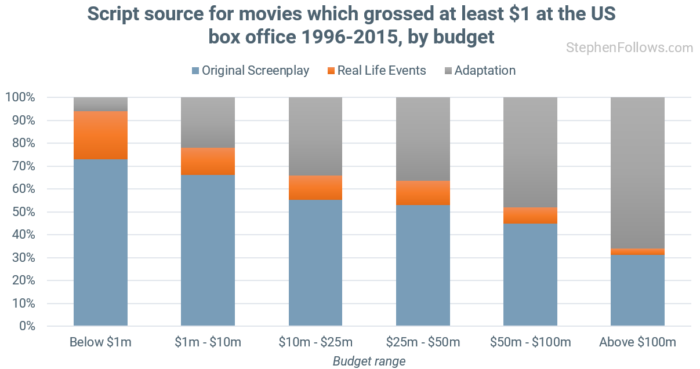
Real life movies by genre
 Another way the movies are unevenly distributed is by genre. Obviously, documentaries are almost entirely created from real life events with rare exceptions such as The Story of the Weeping Camel which is a devised account of nomadic shepherds. One could argue that it’s impossible to have a true documentary which not based on true events, but I am focused on the way the movies were sold to the public, and so there will always be a few outliers which test anyone’s categorisation.
Another way the movies are unevenly distributed is by genre. Obviously, documentaries are almost entirely created from real life events with rare exceptions such as The Story of the Weeping Camel which is a devised account of nomadic shepherds. One could argue that it’s impossible to have a true documentary which not based on true events, but I am focused on the way the movies were sold to the public, and so there will always be a few outliers which test anyone’s categorisation.
Within fiction, drama movies have the highest share of real life events. Interestingly, romantic comedies are the major genre least likely to be based on real life. This could be an example of just how unrealistic Hollywood’s standards are for romance, or it could be illustrating the desire for escapism among fans of the romantic genre. The rare exceptions include Becoming Jane, which is based on the life of Jane Austen.
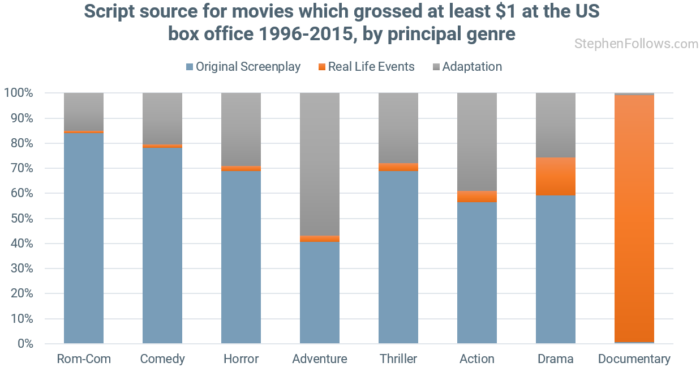
Real life differs around the world
The original question for today’s research came from Kathleen Drumm at TIFF. To help her with her upcoming event, I also had a look at how many Canadian films are based on real life events.
Between 1996 and 2015, Canadian filmmakers based their movies on real life events 24% of the time. That’s more frequent than most of the other countries I studied, although less so than Israeli filmmakers and German filmmakers (30% and 35%, respectively).
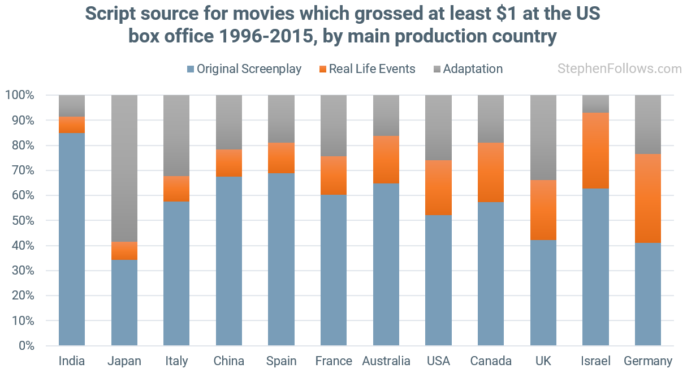
Notes
 All of the data for today’s research relate to feature films which grossed at least $1 at the US theatrical box office. This excludes international movies which did not get a North American theatrical run, straight-to-video movies and made-for-TV movies. The data came from the Opus database, which is a sister to The Numbers website.
All of the data for today’s research relate to feature films which grossed at least $1 at the US theatrical box office. This excludes international movies which did not get a North American theatrical run, straight-to-video movies and made-for-TV movies. The data came from the Opus database, which is a sister to The Numbers website.
Within my classification of based on real life events, I have included movies based on factual books or articles. For example, strictly speaking, The Wolf of Wall Street is an adaptation of a book of the same name but as that book is based on real-life events, it would fall under ‘based on a real life event’ for the purpose of today’s research.
The country figures relate to movies which reached US cinemas so it won’t be a complete picture, favouring the bigger and better funded international movies.
Epilogue
Next week I’m going to look at the quality of movies based on real life events.
I am always keen to get questions from readers so if there’s something you want to know then drop me a line.


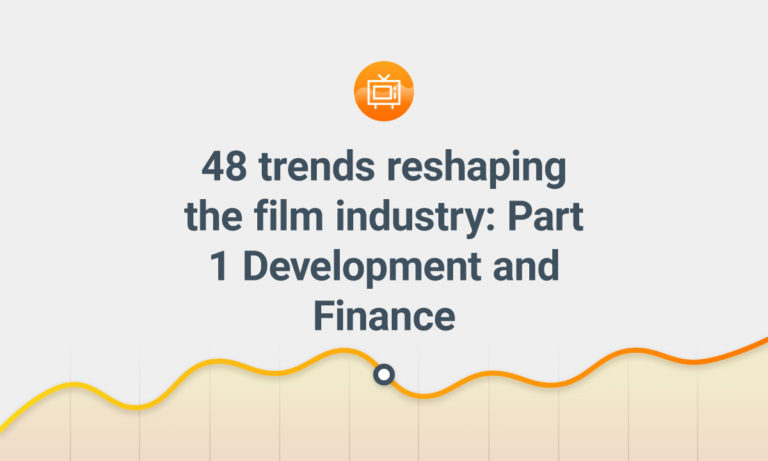
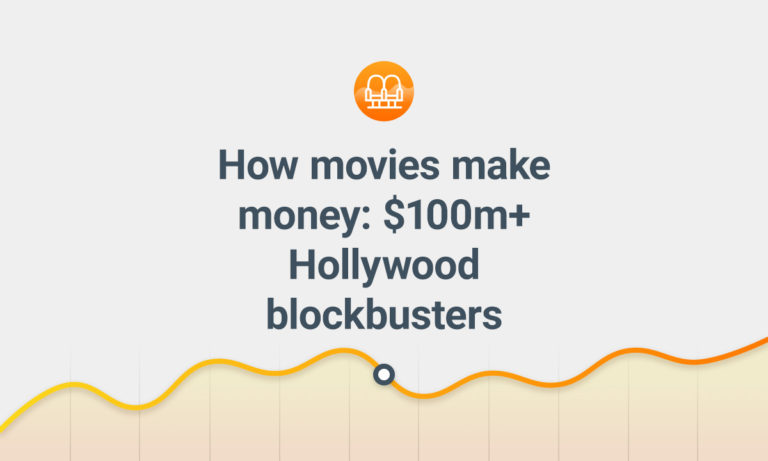

Comments
Hi Stephen,
Thanks a lot for this great research. This is very helpful as I’m writing my dissertation about films and TV series based on true events. In your first graph, does that only include films made in the US or just US box office reports? Do you have the same one with global box office data?
Thanks for your help!
I like movies based on true life events! I like many other movies too!